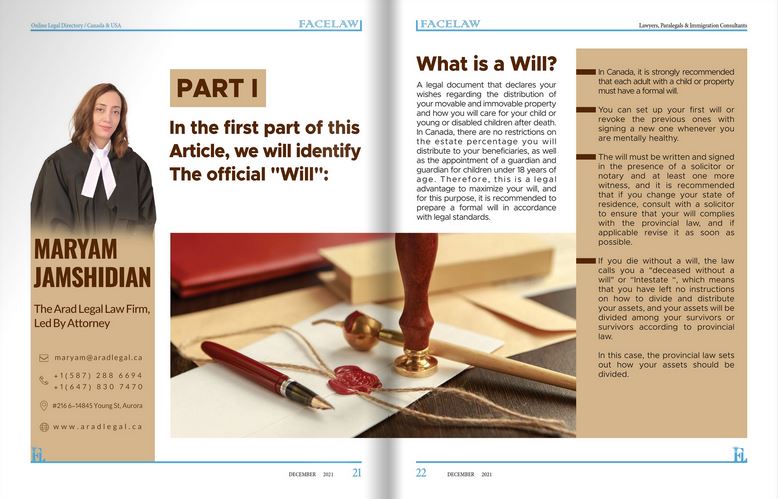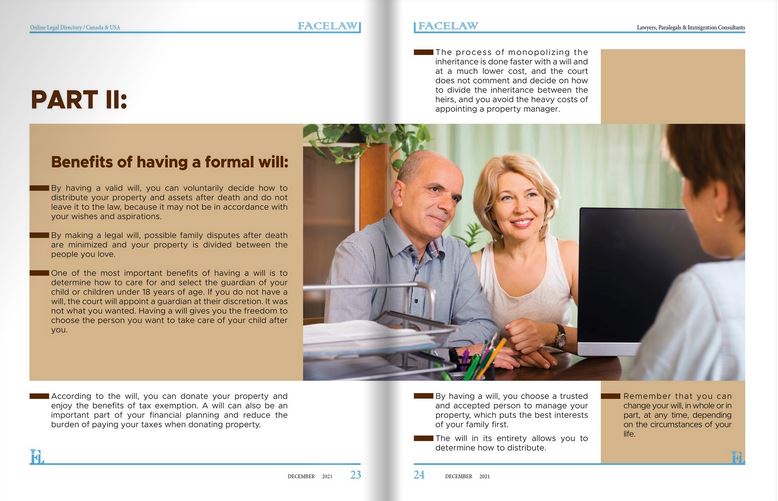What is a Will?
WILL:
In the first part of this article, we will identify the official "Will":
What is a Will?
• A legal document that declares your wishes regarding the distribution of your movable and immovable property and how you will care for your child or young or disabled children after death. In Canada, there are no restrictions on the estate percentage you will distribute to your beneficiaries, as well as the appointment of a guardian and guardian for children under 18 years of age. Therefore, this is a legal advantage to maximize your will, and for this purpose, it is recommended to prepare a formal will in accordance with legal standards.
• In Canada, it is strongly recommended that each adult with a child or property must have a formal will.
• You can set up your first will or revoke the previous ones with signing a new one whenever you are mentally healthy.
• The will must be written and signed in the presence of a solicitor or notary and at least one more witness, and it is recommended that if you change your state of residence, consult with a solicitor to ensure that your will complies with the provincial law, and if applicable revise it as soon as possible.
• If you die without a will, the law calls you a "deceased without a will" or “Intestate “, which means that you have left no instructions on how to divide and distribute your assets, and your assets will be divided among your survivors or survivors according to provincial law. In this case, the provincial law sets out how your assets should be divided.
Part II:
Benefits of having a formal will:
1. By having a valid will, you can voluntarily decide how to distribute your property and assets after death and do not leave it to the law, because it may not be in accordance with your wishes and aspirations.
2. By making a legal will, possible family disputes after death are minimized and your property is divided between the people you love.
3. One of the most important benefits of having a will is to determine how to care for and select the guardian of your child or children under 18 years of age. If you do not have a will, the court will appoint a guardian at your discretion. It was not what you wanted. Having a will gives you the freedom to choose the person you want to take care of your child after you.
4. According to the will, you can donate your property and enjoy the benefits of tax exemption. A will can also be an important part of your financial planning and reduce the burden of paying your taxes when donating property.
5. The process of monopolizing the inheritance is done faster with a will and at a much lower cost, and the court does not comment and decide on how to divide the inheritance between the heirs, and you avoid the heavy costs of appointing a property manager.
6. By having a will, you choose a trusted and accepted person to manage your property, which puts the best interests of your family first.
7. The will in its entirety allows you to determine how to distribute.
8. Remember that you can change your will, in whole or in part, at any time, depending on the circumstances of your life.




Click here to visit Maryam Jamshidian’s Page for further information
Wills and Estates Lawyer in toronto
list of wills and estates lawyers in toronto
top wills and estates lawyer in toronto
iranian wills and estates lawyer in toronto
persian wills and estates lawyer in toronto
top iranian wills and estates lawyer in toronto
list of persian wills and estates lawyers in toronto
Wills and Estates Lawyer in canada
list of wills and estates lawyers in canada
top wills and estates lawyer in canada
iranian wills and estates lawyer in canada
persian wills and estates lawyer in canada
top iranian wills and estates lawyer in canada
list of persian wills and estates lawyers in canada


